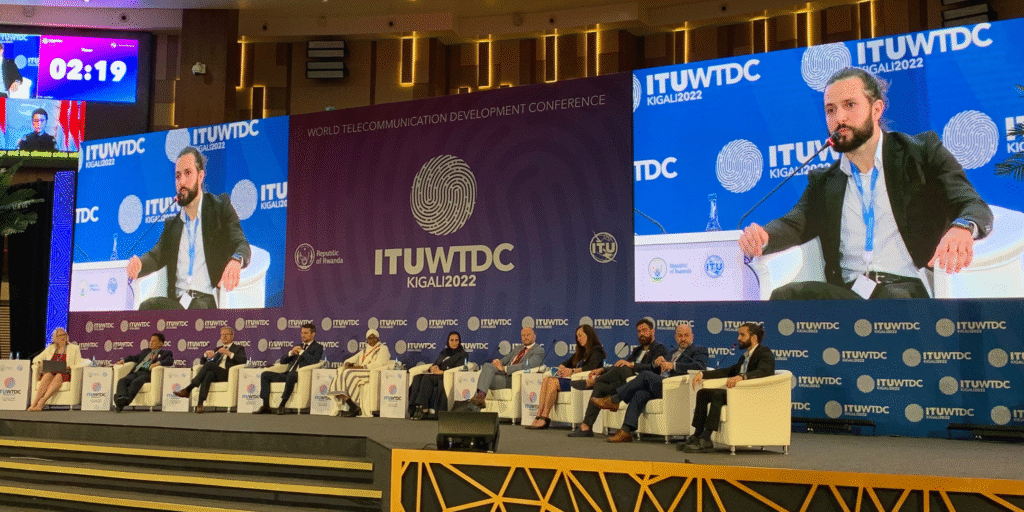

Hussein Abul-Enein
Public Sector


Access Partnership participated at the International Telecommunications Union’s (ITU) World Telecommunications Development Conference (WTDC) which took place in Kigali, Rwanda from 6-16 June at the Kigali Convention Centre. Heads of State, Ministers, officials, top industry players, academia, youths, and international organizations joined forces in this Final Decade of Action to harness digital technologies to drive socio-economic development and re-energize progress towards the United Nation’s (UN) 2030 Sustainable Development Goals (SDGs).
Under the theme ‘Connecting the unconnected to achieve sustainable development’, WTDC gathered 2,152 participants representing 150 Member States and 340 Sector members and partners, with 1,304 delegates present in the Rwandan capital, and another 848 joining the meetings remotely.
Through its Development Sector (ITU-D) and its Telecommunication Development Bureau (BDT), the ITU is leading international efforts to close the digital divide and drive digital transformation globally. WTDC is the engine that makes this possible. Organised every four years along with Regional Preparatory Meetings, these forums foster discussion and help guide ITU’s work towards the key goal of connecting the nearly three billion people that are still unconnected. That is why it was critical to host WTDC at the African continent to demonstrate that the ITU is a UN specialized agency, not just for technology but also for development.
The Kigali Action Plan: The Kigali Action Plan charts a course for digital development that aligns closely with the UN SDGs. It also defines the workplan of the ITU-D until the next WTDC after four years. The Kigali Action Plan and the Kigali Declaration (see below) adopted by WTDC-22 will enable ITU-D and BDT to foster meaningful universal connectivity and sustainable digital transformation around the world in the period 2022-2025.
The Kigali Declaration: The Declaration highlights the main conclusions and priorities established by the conference. Adopting the Kigali Declaration, delegates underscored their collective commitment to universal and meaningful connectivity and approved the new Regional Initiatives.
14 new ITU-D Study Group Questions: Resolution 2 on the Establishment of Study Groups was a topic of much debate, especially in terms of the topic title for each study group and the sub-topic for each study question. After achieving consensus, the two study groups will look at questions related to “an enabling environment for meaningful connectivity” and “digital transformation”, respectively.
45 revised resolutions: Through a long series of plenary, committee, ad hoc, and informal meetings, 45 revised resolutions were adopted. Key issues were related to gender (and non-binary gender), definition of minorities and indigenous people, definition of “meaningful” connectivity (in Resolution 2), cybersecurity, proposed resolution on Open RAN, and China’s proposal to Resolution 63 on IPv6.
4 new resolutions: 4 new resolutions were adopted on (1) digital transformation for sustainable development, (2) connecting every school to the internet and every young person to information and communication technology services, (3) the ITU Partner2Connect Digital Coalition, and (4) fostering telecommunication/ICT-centric entrepreneurship and digital innovation ecosystems for sustainable digital development.
Generation Connect Global Youth Summit: The first-ever Generation Connect Global Youth Summit was held on 2-4 June. The summit resulted in the outcome document Generation Connect Youth Call to Action, entitled ”My Digital Future”. This document represents the voices of over 420 young people from around the world and became a key topic of discussion for the Kigali Action Plan and Declaration.
Network of Women (NoW): Launched in 2021, the NoW aims to promote the active participation of women in the activities of ITU and the ICT sector in general; and to give visibility to women and empower them for bigger responsibilities in their delegations at WTDC and in future similar events. This was stipulated in Resolution 55 on mainstreaming gender in the ITU.
Partner2Connect pledges: Public-private partnerships were at the forefront with the conference’s Partner2Connect (P2C) Digital Development Roundtable. Since its launch, the multistakeholder P2C Coalition has to date mobilized 419 ground-breaking connectivity pledges (and counting) worth an estimated USD 25.05 billion.
All WTDC outcome documents are available through this link.
Access Partnership is proud of our pledge on satellite connectivity to achieve resilience and sustainability. We have pledged to utilise our public policy expertise to advocate for agile regulation and policies that will allow further connectivity for people everywhere.
“As Access Partnership, we invite all policy makers, regulators and private sector to use our research as a starting point to lift the regulatory barriers that limit how we mitigate the climate crisis. Satellite connectivity can be used now, for disaster preparedness worldwide. One life lost is one too many.”
Ivan Suarez, Senior Policy Manager at Access Partnership
As a sector member of the ITU, Access Partnership actively participates at ITU events worldwide – why not get in touch for the next ITU event? If you are interested in learning more about Access Partnership’s participation and initiatives, or require on-the-ground policy support, please contact Hussein Abul-Enein or Ivan Suarez.

